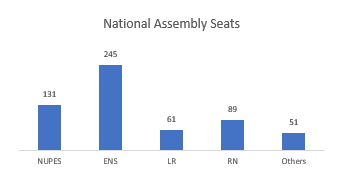Bonjour
I landed in Paris the day of the European parliamentary elections to visit Disneyland Paris.
What a magical place indeed, for kids and grown-ups, except for all the lines and the overpriced food.
That same day French President Macron dissolved the parliament following a bad result from his party in the elections and a good result of Marine Le Pen’s National Rally (RN) party. This triggered a (two-round) snap election, well ahead of the initial 2027 presidential and parliamentary timeline.
This announcement was completely unexpected and can pave the way for RN to be the leading party in France.
What is the exact timetable for these elections.
After registration of candidacies until 16 June, the campaign has started 17 June until first-round election on 30 June. On 2 July candidacies need to be registered for the second round on 7 July. On 18 July the new National Assembly start discussions about the new government and a new prime minister may be appointed before the Olympic Games start on 26 July.
Who are the main parties (based on 2022 general elections).
The National Assembly is currently composed of four main parties (from left to right):
Front Populaire / NUPES – left
Ensemble! (ENS) – centre
Les Républicains (LR) – centre-right
National Rally (RN) – far-right
Why did Macron make this decision
Some say the current political context would make difficult the approval of the 2025 budget at the National Assembly and that there could be a non-confidence vote against the government, which would have forced Macron to dissolve anyway. Others claim that Macron wanted to put the RN on the limelight and expect them to fail once they do have the ability to govern and loose support by the 2027 elections. This scenario would mean that Macron expects France to be worse-off in three years’ and does not sound reasonable. Nevertheless, it is still a possibility.
Will France be worst-off if RN wins the elections?
The National Rally has softened its anti-EU stance and they don’t seem to be calling for Frexit anymore; but at the same time, it remains firmly against European integration. On top of that, its platform (from 2022) is likely to further weaken French public finances.
The RN promised an increase in spending and fiscal relief which would result in budget deficits over the next years. This would push French public debt to even higher levels than they are today. The truth is France was already struggling to operate within EU budgetary constraints, so the market felt nervous about these events. The tone of some RN leaders may have changed recently to call upon the need for fiscal consolidation and questioning some of the measures proposed, e.g., pension reform, but some damage is already done.
This is starting to get expensive.
French equities have underperformed dramatically following Macron’s announcement (the CAC-40 gave back the entirety of its YTD gains), while the France/Germany spread rose to historical levels. And concerns that trouble is arising in the heart of Europe have influenced sentiment more broadly as investors are now expecting several weeks of uncertainty, volatility and a potentially market-unfriendly outcome from the elections.
This is starting to get uncomfortable.
Marine Le Pen’s National Rally is ahead in the polls 33%, with left wing Popular Front at 28% and Macron’s Renaissance party at 18% (https://www.france24.com/en/france/20240618-macron-defends-surprise-snap-election-call-most-responsible-solution-france).
In an interview with Le Figaro Marine Le Pen said she would not try to push out President Macron if she wins the Parliamentary election to appeal to moderates and investors. She said she’s respectful of institutions and not calling for institutional chaos and there would “simply be cohabitation”.
French people are also on the streets protesting against the rise of the far-right to defend the values of freedom, equality and fraternity for all.
It feels like magic is slowly fading away.


